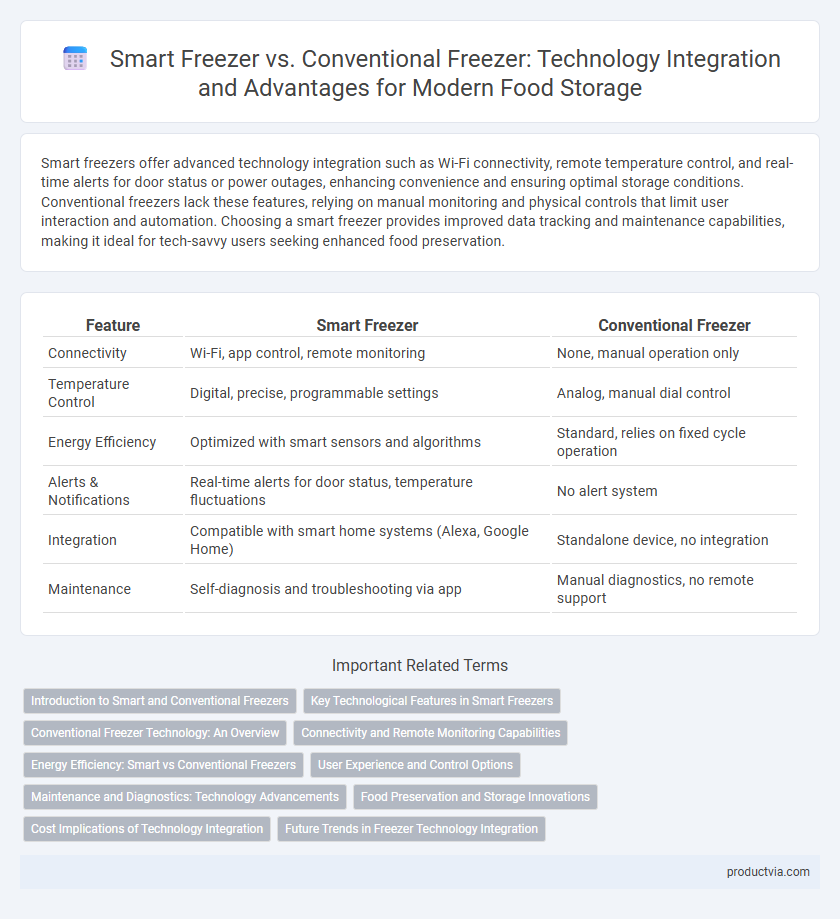Smart freezers offer advanced technology integration such as Wi-Fi connectivity, remote temperature control, and real-time alerts for door status or power outages, enhancing convenience and ensuring optimal storage conditions. Conventional freezers lack these features, relying on manual monitoring and physical controls that limit user interaction and automation. Choosing a smart freezer provides improved data tracking and maintenance capabilities, making it ideal for tech-savvy users seeking enhanced food preservation.
Table of Comparison
| Feature | Smart Freezer | Conventional Freezer |
|---|---|---|
| Connectivity | Wi-Fi, app control, remote monitoring | None, manual operation only |
| Temperature Control | Digital, precise, programmable settings | Analog, manual dial control |
| Energy Efficiency | Optimized with smart sensors and algorithms | Standard, relies on fixed cycle operation |
| Alerts & Notifications | Real-time alerts for door status, temperature fluctuations | No alert system |
| Integration | Compatible with smart home systems (Alexa, Google Home) | Standalone device, no integration |
| Maintenance | Self-diagnosis and troubleshooting via app | Manual diagnostics, no remote support |
Introduction to Smart and Conventional Freezers
Smart freezers incorporate advanced technology such as Wi-Fi connectivity, touchscreen interfaces, and remote monitoring, enabling users to control temperature and receive alerts via smartphone apps. Conventional freezers rely on manual controls and lack connectivity features, limiting user interaction to physical adjustments and in-person inspections. The integration of sensors and IoT technology in smart freezers offers enhanced energy efficiency and proactive maintenance compared to traditional models.
Key Technological Features in Smart Freezers
Smart freezers integrate advanced technology such as IoT connectivity, precise temperature control sensors, and remote monitoring via mobile apps, enabling users to optimize food preservation and energy efficiency. Features like adaptive defrost systems and automatic inventory tracking differentiate smart freezers from conventional models, which lack real-time status updates and customization options. These innovations contribute to reducing food waste and lowering operational costs by enhancing user control and predictive maintenance capabilities.
Conventional Freezer Technology: An Overview
Conventional freezer technology primarily relies on basic refrigeration cycles using compressors, evaporators, and refrigerants like R134a or R600a to maintain low temperatures. These systems operate with fixed temperature settings and lack connectivity features, limiting remote monitoring and energy management capabilities. Despite their simplicity, conventional freezers are valued for reliability, affordability, and straightforward maintenance but fall short in integrating smart technology for automated performance optimization.
Connectivity and Remote Monitoring Capabilities
Smart freezers feature advanced connectivity through Wi-Fi or Bluetooth, enabling seamless integration with home automation systems. These freezers offer remote monitoring capabilities via dedicated mobile apps, allowing users to track temperature, receive alerts, and adjust settings from anywhere. In contrast, conventional freezers lack connectivity and remote management, relying solely on manual controls and local temperature displays.
Energy Efficiency: Smart vs Conventional Freezers
Smart freezers utilize advanced sensors and adaptive temperature controls to optimize energy use, often reducing power consumption by up to 30% compared to conventional freezers. Conventional freezers operate at a constant cooling level, leading to higher energy expenditure and less efficient temperature regulation. Integration with IoT technology in smart freezers enables real-time monitoring and automated adjustments, significantly enhancing overall energy efficiency.
User Experience and Control Options
Smart freezers offer advanced technology integration with intuitive touchscreen interfaces and remote control via mobile apps, enhancing user experience through real-time temperature monitoring and customizable settings. Conventional freezers rely on manual controls and lack connectivity features, limiting user convenience and control flexibility. Smart freezers' integration with IoT enables energy-efficient operation and proactive maintenance alerts, representing a significant improvement in user-centric design.
Maintenance and Diagnostics: Technology Advancements
Smart freezers integrate advanced sensors and IoT technology, allowing real-time monitoring and predictive maintenance that reduces manual checks and minimizes downtime. Conventional freezers lack these diagnostic capabilities, often requiring manual inspections and reactive repairs, leading to longer maintenance cycles and higher operational costs. Technology advancements in smart freezers enable automatic alerts and remote troubleshooting, enhancing efficiency and prolonging appliance lifespan.
Food Preservation and Storage Innovations
Smart freezers leverage advanced temperature sensors, humidity control, and AI-driven algorithms to optimize food preservation by maintaining ideal conditions and reducing spoilage. Conventional freezers rely on static temperature settings and manual adjustments, lacking real-time monitoring and adaptive responses to environmental changes. Integrating IoT technology in smart freezers enhances storage efficiency, allowing users to track inventory and expiration dates, thus minimizing food waste and improving freshness retention significantly.
Cost Implications of Technology Integration
Smart freezers with integrated IoT technology typically incur higher upfront costs compared to conventional freezers due to advanced sensors, connectivity modules, and software integration. However, the long-term operational savings from energy efficiency, remote monitoring, and predictive maintenance can offset initial expenses. Conventional freezers lack these smart features, resulting in lower initial costs but potentially higher ongoing energy and maintenance expenses.
Future Trends in Freezer Technology Integration
Smart freezers incorporate advanced sensors, IoT connectivity, and AI-driven temperature management to optimize energy efficiency and food preservation, surpassing conventional freezers that rely on basic mechanical controls. Future trends emphasize seamless integration with smart home systems, predictive maintenance alerts, and adaptive cooling algorithms that respond to usage patterns. These innovations aim to enhance user convenience, reduce power consumption, and extend the lifespan of frozen goods through real-time data analytics and remote monitoring capabilities.
Smart freezer vs Conventional freezer for technology integration Infographic

 productvia.com
productvia.com